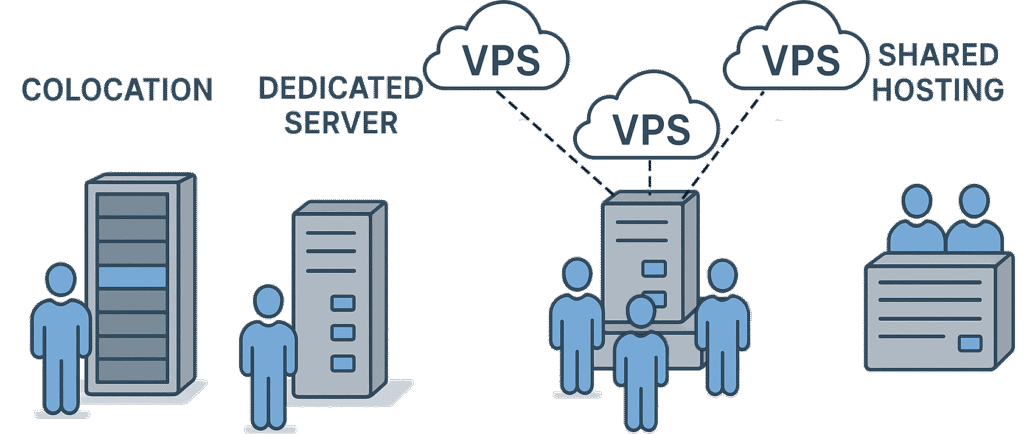
Understanding the Differences Between Colocation, Dedicated Servers, VPS, and Shared Hosting
Choosing the right hosting solution for your business can be a daunting task, especially with the variety of options available. In this blog post, we’ll break down the differences between Colocation, Dedicated Servers, Virtual Private Servers (VPS), and Shared Hosting to help you determine the best fit for your needs.
1. Colocation
What is Colocation? Colocation involves renting space in a data center to house your own server hardware. The data center provides the physical security, power, cooling, and internet connectivity, while you maintain control over the server’s hardware and software.
Pros:
- Full Control: You have complete control over your server’s hardware and software.
- Scalability: Easily scale by adding more servers as needed.
- Security: Data centers offer robust physical and network security measures.
Cons:
- Cost: Higher initial investment in server hardware.
- Maintenance: You are responsible for maintaining and upgrading your hardware. You may have to travel to the data center to do maintenance or pay someone to do the work.
Best For:
- Businesses with specific hardware requirements.
- Companies needing high levels of control and customization.
2. Dedicated Servers
What is a Dedicated Server? A dedicated server is a physical server rented from a hosting provider. The server is exclusively yours, meaning you don’t share its resources with anyone else.
Pros:
- Performance: High performance with dedicated resources.
- Customization: Full control over server configuration and software.
- Security: Enhanced security as you are the sole user of the server.
Cons:
- Cost: More expensive than shared or VPS hosting.
- Management: Requires technical expertise to manage and maintain.
Best For:
- High-traffic websites.
- Applications requiring significant resources and customization.
3. Virtual Private Servers (VPS)
What is a VPS? A VPS is a virtualized server that mimics a dedicated server within a shared hosting environment. Each VPS has its own dedicated resources and operates independently of other VPS instances on the same physical server.
Pros:
- Cost-Effective: More affordable than dedicated servers.
- Scalability: Easily scalable by adjusting resources as needed.
- Control: Greater control compared to shared hosting, with root access.
Cons:
- Resource Limits: Limited by the physical server’s resources and the plan limits.
- Management: Requires some technical knowledge to manage.
Best For:
- Medium-sized businesses.
- Websites or applications needing more control and resources than shared hosting.
4. Shared Hosting
What is Shared Hosting? Shared hosting involves multiple websites sharing the same physical server and its resources. It’s the most cost-effective hosting solution.
Pros:
- Affordable: Lowest cost among hosting options.
- Ease of Use: User-friendly with minimal technical knowledge required.
- Maintenance: Hosting provider handles server maintenance and updates.
Cons:
- Performance: Limited resources can lead to slower performance during peak times.
- Security: Higher risk of security issues due to shared environment depending on host configuration.
- Customization: Limited control over server settings and software.
Best For:
- Small businesses and personal websites.
- Beginners with limited technical expertise.
How to Determine the Right Solution for Your Needs
- Assess Your Requirements: Consider the size of your website, expected traffic, and specific resource needs.
- Budget: Determine how much you are willing to spend on hosting.
- Technical Expertise: Evaluate your ability to manage and maintain the server.
- Scalability: Consider future growth and whether the hosting solution can scale with your needs.
- Security: Assess the level of security required for your data and applications.
Conclusion
Choosing the right hosting solution depends on your specific needs and circumstances. Colocation offers maximum control and scalability, while dedicated servers provide high performance and security. VPS hosting strikes a balance between cost and control, and shared hosting is ideal for those on a tight budget or just starting out. By understanding the differences and evaluating your requirements, you can make an informed decision that best suits your business.
If you have any questions or need further assistance in choosing the right hosting solution, feel free to reach out!

